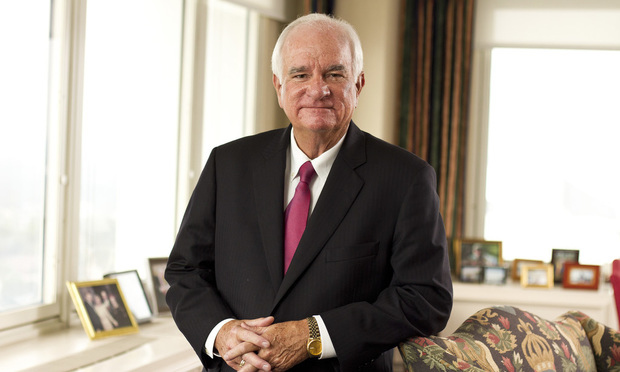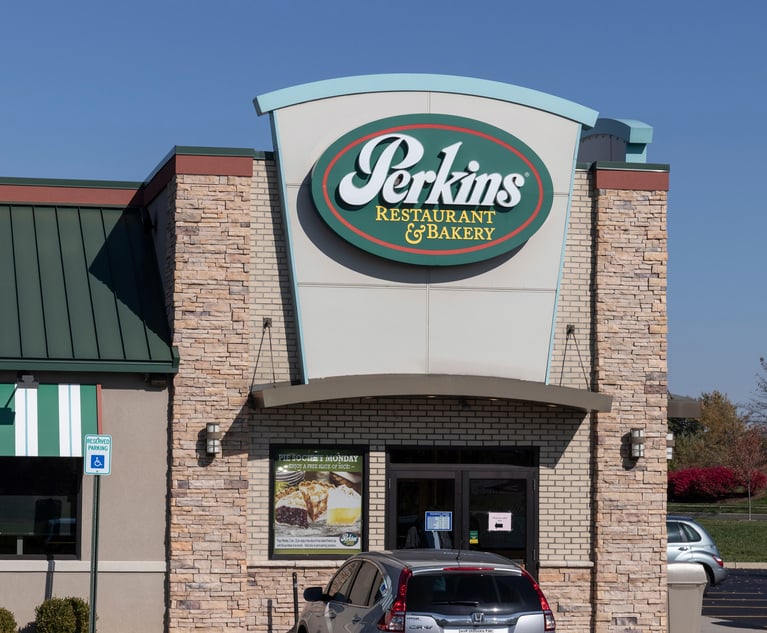Judge: Amazon Not Liable for Injuries From Hoverboard Fire
Judge Thomas Thrash wrote that the injured man's complaint did not show that Amazon had sufficient notice that the hazardous hoverboard could burst into flame before selling it.
October 18, 2018 at 08:21 PM
6 minute read
 Chief Judge Thomas Thrash Jr., U.S. District Court for the Northern District of Georgia. (Photo: John Disney/ ALM)
Chief Judge Thomas Thrash Jr., U.S. District Court for the Northern District of Georgia. (Photo: John Disney/ ALM)
A federal judge in Atlanta has tossed out claims against Amazon leveled by a man who was severely burned and lost his home when a hoverboard caught fire in 2016, ruling the shipper was not on notice about the hazards of the device when it was sold.
Chief Judge Thomas Thrash Jr.'s order filed Wednesday in response to Amazon's motion to dismiss seems to leave little remaining in the case since the remaining co-defendants, including the Chinese manufacturers of the hoverboard and battery, never responded to the suit filed in February in the U.S. District Court for the Northern District of Georgia.
Lead plaintiffs attorney Darren Penn said that, while he may seek default judgment against the other defendants, there's little likelihood of recovering from them.
“The reality is that foreign judgments are generally ignored in China, so it would be a very difficult road indeed,” Penn said via email.
Penn lamented that Amazon was dismissed at such an early stage in the proceedings.
“I have an enormous amount of respect for Judge Thrash,” said Penn. “He is an outstanding jurist, no doubt about that. But I respectfully disagree with this order of dismissal before any factual discovery could be conducted into what exactly Amazon knew and when it knew it.”
Plaintiff Irvin Love Jr. “is considering his options at this time and no final decision has been made,” said Penn, who is handling the case with Penn Law colleague Laura Penn and David Dreyer, who recently left the firm to join start-up Dreyer Sterling.
Amazon's counsel, Hawkins Parnell Thackston & Young partners Willie Ellis Jr. and Michael Goldman, did not immediately respond to request for comment Thursday.
As detailed in court filings, Love ordered the Weecoo brand hoverboard for his girlfriend's daughter as a Christmas present in 2015.
In February 2016, the hoverboard's lithium-ion battery started a fire at Love's house while it wasn't plugged in. Love was burned on his head, face, back and shoulders, and suffered smoke inhalation while he and his girlfriend escaped the house. His home was destroyed, and he lost personal property worth more than $50,000.
The fire was so hot, Love's gun safe melted, the complaint said.
Love was first transported to Memorial University Medical Center in Savannah, then immediately taken to the Joseph M. Still Burn Center in Augusta, where he required grafts of cadaver skin.
Love sued 17 defendants in February, including several Amazon entities, a Hong-Kong based shipper, eight subsidiaries of Chinese conglomerate Shenzhen, which made the hoverboard and battery, and Weecoo.
Weecoo hoverboards are no longer carried by Amazon, and a web search did not indicate that they can still be purchased in the United States, if at all.
The suit included claims for strict liability, negligence, fraudulent concealment of defect, failure to warn and breach of warranty of merchantability and fitness.
It said Amazon was on notice that hoverboards sold through its website had been linked to at least nine fires started by their lithium-ion batteries between Nov. 11, 2015, and Jan. 3, 2016.
By mutual consent, all of the Amazon defendants were dismissed, and Amazon.com was substituted as sole defendant for the company.
Amazon filed a motion to dismiss in April, arguing among other things that five of the fires noted in the complaint occurred after Love bought the hoverboard and that the other four occurred between one and 11 days prior to his purchase.
Love “does not allege which manufacturer or model hoverboards were involved, or any other facts that could connect the dots between four fires and the specific model hoverboard that plaintiff bought,” Amazon's motion said.
Thrash agreed, writing in Wednesday's opinion that Love “has not pleaded facts sufficient to show that defendant Amazon had actual or constructive knowledge that the hoverboard sold to the plaintiff was dangerous at the time of sale.”
“The Plaintiff goes into detail about the defects that plagued 'nearly all' hoverboards sold on defendant Amazon's website during the relevant time period” and that “Amazon 'knew' that the hoverboards being sold on its website were poorly manufactured and were likely to cause fires,” Thrash wrote.
“But the plaintiff must do more than assert, in conclusory fashion, that the defendant knew about the product's defects,” Thrash added.
Of the nine fires cited in the complaint, “only the four that occurred prior to the Plaintiff's purchase are relevant to this lawsuit,” he said.
Love asserts that “Amazon 'knew' about these incidents without describing how, when, or where Defendant Amazon received notice of these incidents,” Thrash said.
“Indeed,” he wrote, “the plaintiff omits particularly salient facts like the brand or brands of hoverboards involved in these incidents and the circumstances that gave rise to the fires.”
Penn said Thrash “apparently felt that Mr. Love did not plead his case with enough detail to survive a motion to dismiss … despite the fact that his complaint originally included allegations that Amazon knew about the defective hoverboards and serious injuries caused by these hoverboards before Mr. Love's purchase.”
The ruling “is, in my opinion, evidence of a disturbing trend in the evisceration of notice pleading in state and federal courts,” Penn said. “Today, defendants reflexively file motions to dismiss whether there are grounds or not and plaintiffs are held to a standard of 'particular pleading' and if they are not able to provide some as-of-yet undefined amount of specificity then they are subject to dismissal.”
“As for Mr. Love,” he said, “this is a very difficult result. He has suffered tremendously due to an obviously defective product: one that was effectively recalled.”
This content has been archived. It is available through our partners, LexisNexis® and Bloomberg Law.
To view this content, please continue to their sites.
Not a Lexis Subscriber?
Subscribe Now
Not a Bloomberg Law Subscriber?
Subscribe Now
NOT FOR REPRINT
© 2025 ALM Global, LLC, All Rights Reserved. Request academic re-use from www.copyright.com. All other uses, submit a request to [email protected]. For more information visit Asset & Logo Licensing.
You Might Like
View All
Hungry for Stability After Execs Exit, Papa John's Gives Legal Chief Big Retention Bonus
4 minute read
Walmart Ordered to Pay $1.2M by State Jury for Employee-Caused Injury in Georgia Store


Trending Stories
- 1'It's Not Going to Be Pretty': PayPal, Capital One Face Novel Class Actions Over 'Poaching' Commissions Owed Influencers
- 211th Circuit Rejects Trump's Emergency Request as DOJ Prepares to Release Special Counsel's Final Report
- 3Supreme Court Takes Up Challenge to ACA Task Force
- 4'Tragedy of Unspeakable Proportions:' Could Edison, DWP, Face Lawsuits Over LA Wildfires?
- 5Meta Pulls Plug on DEI Programs
Who Got The Work
Michael G. Bongiorno, Andrew Scott Dulberg and Elizabeth E. Driscoll from Wilmer Cutler Pickering Hale and Dorr have stepped in to represent Symbotic Inc., an A.I.-enabled technology platform that focuses on increasing supply chain efficiency, and other defendants in a pending shareholder derivative lawsuit. The case, filed Oct. 2 in Massachusetts District Court by the Brown Law Firm on behalf of Stephen Austen, accuses certain officers and directors of misleading investors in regard to Symbotic's potential for margin growth by failing to disclose that the company was not equipped to timely deploy its systems or manage expenses through project delays. The case, assigned to U.S. District Judge Nathaniel M. Gorton, is 1:24-cv-12522, Austen v. Cohen et al.
Who Got The Work
Edmund Polubinski and Marie Killmond of Davis Polk & Wardwell have entered appearances for data platform software development company MongoDB and other defendants in a pending shareholder derivative lawsuit. The action, filed Oct. 7 in New York Southern District Court by the Brown Law Firm, accuses the company's directors and/or officers of falsely expressing confidence in the company’s restructuring of its sales incentive plan and downplaying the severity of decreases in its upfront commitments. The case is 1:24-cv-07594, Roy v. Ittycheria et al.
Who Got The Work
Amy O. Bruchs and Kurt F. Ellison of Michael Best & Friedrich have entered appearances for Epic Systems Corp. in a pending employment discrimination lawsuit. The suit was filed Sept. 7 in Wisconsin Western District Court by Levine Eisberner LLC and Siri & Glimstad on behalf of a project manager who claims that he was wrongfully terminated after applying for a religious exemption to the defendant's COVID-19 vaccine mandate. The case, assigned to U.S. Magistrate Judge Anita Marie Boor, is 3:24-cv-00630, Secker, Nathan v. Epic Systems Corporation.
Who Got The Work
David X. Sullivan, Thomas J. Finn and Gregory A. Hall from McCarter & English have entered appearances for Sunrun Installation Services in a pending civil rights lawsuit. The complaint was filed Sept. 4 in Connecticut District Court by attorney Robert M. Berke on behalf of former employee George Edward Steins, who was arrested and charged with employing an unregistered home improvement salesperson. The complaint alleges that had Sunrun informed the Connecticut Department of Consumer Protection that the plaintiff's employment had ended in 2017 and that he no longer held Sunrun's home improvement contractor license, he would not have been hit with charges, which were dismissed in May 2024. The case, assigned to U.S. District Judge Jeffrey A. Meyer, is 3:24-cv-01423, Steins v. Sunrun, Inc. et al.
Who Got The Work
Greenberg Traurig shareholder Joshua L. Raskin has entered an appearance for boohoo.com UK Ltd. in a pending patent infringement lawsuit. The suit, filed Sept. 3 in Texas Eastern District Court by Rozier Hardt McDonough on behalf of Alto Dynamics, asserts five patents related to an online shopping platform. The case, assigned to U.S. District Judge Rodney Gilstrap, is 2:24-cv-00719, Alto Dynamics, LLC v. boohoo.com UK Limited.
Featured Firms
Law Offices of Gary Martin Hays & Associates, P.C.
(470) 294-1674
Law Offices of Mark E. Salomone
(857) 444-6468
Smith & Hassler
(713) 739-1250






